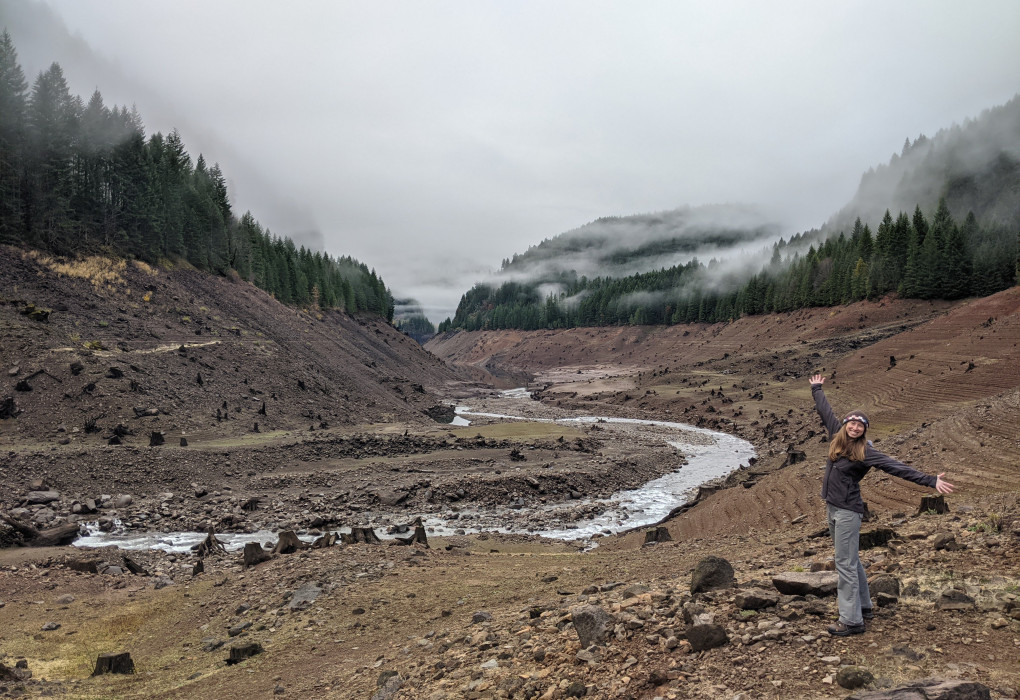What's Happening on the Willamette
Looking out across a barren landscape of thick mud dotted by boulders and tree stumps, you might perceive a scene of destruction, but to Native Fish Society Conservation Director Jennifer Fairbrother, she sees a river reborn and a fighting chance for threatened wild Spring Chinook Salmon and Winter Steelhead in Oregon's Willamette River Basin.
"Just a couple weeks into the deep drawdowns of Cougar and Detroit Reservoirs, we could see that the incoming rivers have carved their way through decades of sediment. They are so clear that we could see the cobble at the bottom," she reported after a visit this past winter to several locations where major changes were being implemented to dam operations after a precedent-setting legal victory this past fall. "To me, this is one of the most beautiful landscape transformations I've been lucky to witness. This is the rebirth of these amazing rivers and a symbol of our capacity to make the changes that are needed to recover wild fish."
Last September, Native Fish Society and our partners at Advocates for the West, WildEarth Guardians, and Northwest Environmental Defense Center won a sweeping victory in our efforts to reform management at the thirteen federally owned and operated dams in the Willamette River Basin.
Not only did the Judge rule that the Army Corps of Engineers, the operator of the dams, has the legal authority to change dam operations to benefit threatened Winter Steelhead and Spring Chinook Salmon populations, but that they had an obligation to make those changes.
Historically, these dams have been a major factor in driving the Willamette's wild fish populations towards extinction. Due to the height of these dams, they were built without traditional fish ladders and their operations for other purposes, such as generating a small amount of hydropower, made it very difficult for fish to migrate downstream. Past dam operations also altered temperatures downstream of the dams resulting in high rates of prespawn mortality (when adult fish die before they are able to reproduce) while erratic flows from dam operations resulted in either dewatering or scouring of redds (the nests of fish eggs).
In his ruling, Judge Hernandez also issued a comprehensive injunction order requiring the Army Corps to take specific actions at the dams that will address major barriers to fish conservation and recovery. Actions include those which focus on improving downstream fish passage for out-migrating juvenile fish and improving water quality and flows downstream of Army Corps dams.
Actions aimed at improving fish passage include seasonal deep drawdowns of reservoirs which commenced last fall at Cougar Dam on the McKenzie River, Detroit Dam on the North Santiam, and Fall Creek Dam in the Middle Fork Willamette subbasin. Deep drawdowns aid juvenile fish in navigating through reservoirs to the dams as well as bringing the surface of the reservoirs closer to the outlets that fish can use to pass through the dams. Spill over Foster Dam on the South Santiam and changes to hydropower generation at multiple dams were also implemented this past fall to improve the success of downstream fish passage.
Changes in how water is passed through the dams were implemented as well with the aim to improve water temperatures and dissolved gasses in the reaches downstream of dams to support adequate water quality conditions for adult fish migration and spawning and egg incubation. Further operational actions are ordered to begin this spring and into next fall.
The court set up an expert advisory committee consisting of fisheries and hydrology experts to work collaboratively on designing action implementation plans and associated research, monitoring, and evaluation plans as well as mandating that the Army Corps provide progress reports every six months. These progress reports will contain information on the execution of the court-ordered actions and any research, monitoring, and evaluation data and analysis that is available. The first implementation report was just released and is available for review by the public.
There's a lot more ahead for the Willamette River Basin in 2022 and beyond as NFS and our partners continue to work towards important objectives that can further improve dam operations and infrastructure to put the Willamette's threatened wild fish back on the road to recovery.
